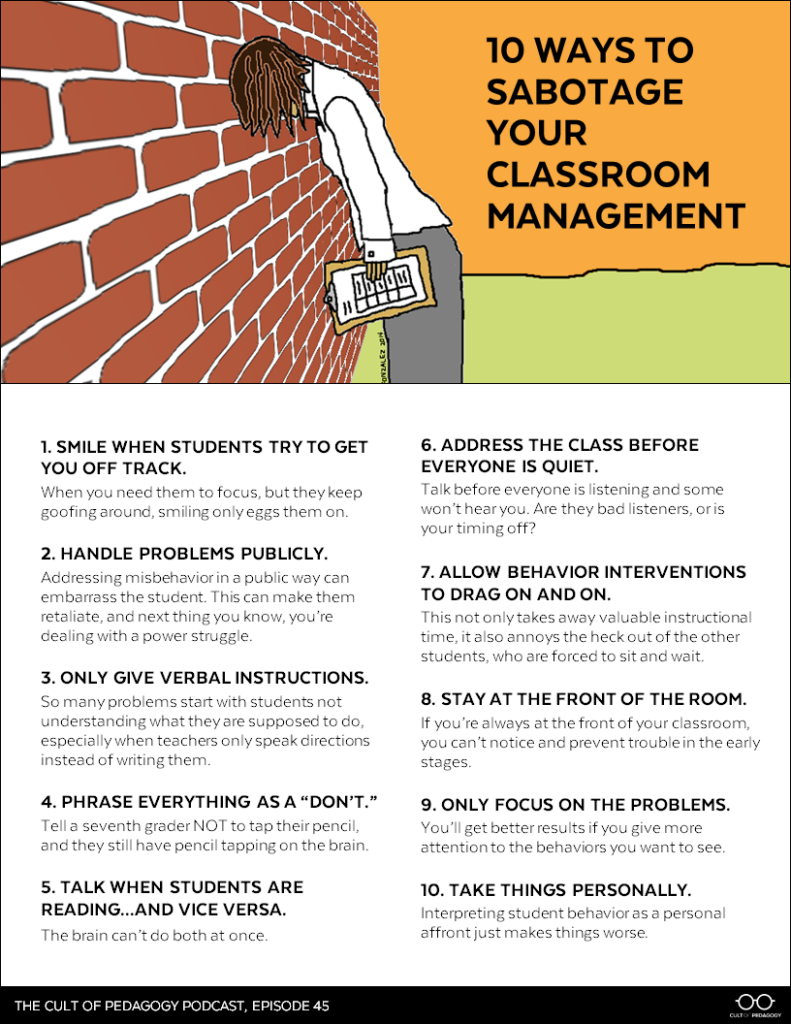Listen to this post as a podcast:
If you struggle with classroom management no matter how many different strategies you try, there’s a good chance you might be doing something to get in your own way. In this post I wrote for MiddleWeb, I explain how each one of these teacher mistakes can cause problems for you, and what you can do instead.
Read the full post HERE.
Come back for more.
Join our mailing list and get weekly tips, tools, and inspiration that will make your teaching more effective and fun. You’ll get access to our members-only library of free downloads, including 20 Ways to Cut Your Grading Time in Half, the e-booklet that has helped thousands of teachers save time on grading. Over 50,000 teachers have already joined—come on in.
Join our mailing list and get weekly tips, tools, and inspiration that will make your teaching more effective and fun. You’ll get access to our members-only library of free downloads, including 20 Ways to Cut Your Grading Time in Half, the e-booklet that has helped thousands of teachers save time on grading. Over 50,000 teachers have already joined—come on in.






You can add “write kids up” to the list. As an experiment and personal goal, I made zero discipline referrals this year. And because of that, I haven’t had to make any discipline referrals. It’s oddly circular and quite refreshing.
Hi Misty,
I think your point is valid and I would guess there is a good amount of relationship building and respect that go both ways. I have found that building relationships and having students know you respect them is going to lead to less confrontation and allows for many “problems” to fix them-selves. Furthermore, I think that you do a good job of bringing to the forefront the fact that how we respond sets the tone and by not always being punitive we can help end the cycle of bad behavior by eliminating the fuel that adds fire to the said cycle–that is one size fits all punitive responses.
thanks i will stop doing some of the things in the article.
I teach preschool four and fives… we have a “rest time” but the children don’t settle down and are not quiet. What suggestions do you have?
This isn’t my area of expertise, but I had a chance to sub for a pre-school class one summer and here are some things that took place before I arrived and it seemed to work well. It’s not really different from what we’d do with other age groups. Routines, procedures, and expectations were clearly established, taught step-by-step, modeled as often as needed, and practiced a lot … from the onset. Discussions were had about the importance of rest and how even if we aren’t feeling the need to rest ourselves, as part of the community, we need to do things that are helpful to everyone. This was the empathy piece that was taught. Also, as long as kids were in their designated spot and quiet, they had the option to look at a book. It was also important for the teacher to be there, as a participant, sitting back, showing she was resting and enjoying the quiet. Soft music was also playing with lights dimmed. Teachers weren’t on the computer or doing work. This was a rest time for everybody. Hard to do, I know, but kids are aware of everything and they look to their teachers as models. The teachers were able to be there to quietly guide, monitor, encourage, or redirect as needed.
Check out the website Stop Breathe Think! It is a mindfulness/meditation/self regulating site that offers wonderful ways for students to recenter and regroup. They offer teachers FULL FREE access to both the kids and adult app. I use the web app and run some of the breathing calming/quiet/sleep breathing videos on my interactive board. It give my busy kids something to “do” while my others that need quiet can still get it too.
This is a wonderful post because it pointed out most of the things I use to do that has put me in difficulties.
I see a disconnect here typical of the abuse/disrespect/blaming teachers suffer in this broken industry…the last item advises us not to take misbehavior personally. Every other point on the list places classroom management problems at the foot of the teacher. If we aren’t supposed to take it personally, why are you positing student inattention & defiance as functions of the teacher’s failings? Both can’t be true.
Hi Misty.
Thanks for bringing this up. Classroom management is challenging. Students come to us with all kinds of behaviors that have nothing to do with the teacher. Inattention, frustration, anger – any of these could have resulted from something that happened earlier on the bus, not having breakfast, not getting a good night’s sleep, or just not understanding an assignment. I think the message here is more about how we respond to challenging behaviors – not that we’re responsible for them, but we are responsible for how we react. For example, from my experience, addressing behaviors publicly with some kids just made things a whole lot worse. When I waited a bit to talk to them privately, we were able to figure out what was going on and come up with some sort of solution. By not taking things personally, we’re less likely to get upset and react with our own anger. Whenever possible, it’s just a good idea to avoid responding in ways that might escalate the behavior and thus sabotage relationships as well as classroom management.
And nowadays when it’s not safe to speak privately in the hallway with students? Recommendations?
Hi Cheryl, if you’re referring to the tip about not addressing student behavior in a public manner- one alternative to taking a student out in the hallway is redirecting the class so you can have a private conversation somewhere in the room. If one of my students needs my attention, I usually call them over to my desk and ask them to pull up a chair so we can discuss whatever is going on while the rest of the class keeps working. You can also have conversations with your students to see how they’d prefer to handle moments of redirection. They might have some ideas to share as well. Best of luck!